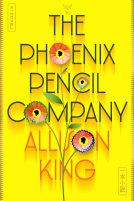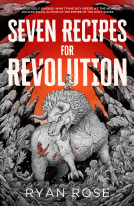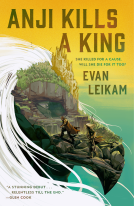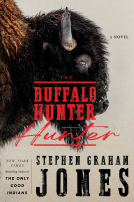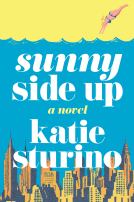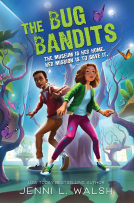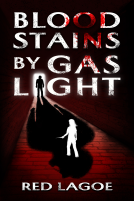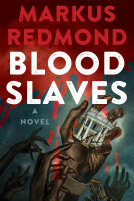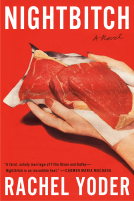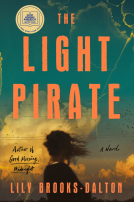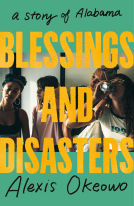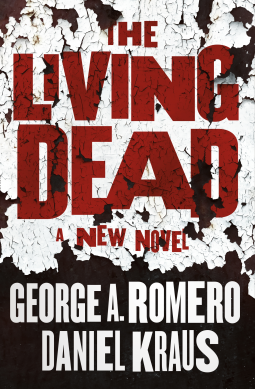
The Living Dead
by George A. Romero; Daniel Kraus
This title was previously available on NetGalley and is now archived.
Send NetGalley books directly to your Kindle or Kindle app
1
To read on a Kindle or Kindle app, please add kindle@netgalley.com as an approved email address to receive files in your Amazon account. Click here for step-by-step instructions.
2
Also find your Kindle email address within your Amazon account, and enter it here.
Pub Date Aug 04 2020 | Archive Date Mar 31 2021
Macmillan-Tor/Forge | Tor Books
Description
“A horror landmark and a work of gory genius.”—Joe Hill, New York Times bestselling author of The Fireman
New York Times bestselling author Daniel Kraus completes George A. Romero's brand-new masterpiece of zombie horror, the massive novel left unfinished at Romero's death!
George A. Romero invented the modern zombie with Night of the Living Dead, creating a monster that has become a key part of pop culture. Romero often felt hemmed in by the constraints of film-making. To tell the story of the rise of the zombies and the fall of humanity the way it should be told, Romero turned to fiction. Unfortunately, when he died, the story was incomplete.
Enter Daniel Kraus, co-author, with Guillermo del Toro, of the New York Times bestseller The Shape of Water (based on the Academy Award-winning movie) and Trollhunters (which became an Emmy Award-winning series), and author of The Death and Life of Zebulon Finch (an Entertainment Weekly Top 10 Book of the Year). A lifelong Romero fan, Kraus was honored to be asked, by Romero's widow, to complete The Living Dead.
Set in the present day, The Living Dead is an entirely new tale, the story of the zombie plague as George A. Romero wanted to tell it.
It begins with one body.
A pair of medical examiners find themselves battling a dead man who won’t stay dead.
It spreads quickly.
In a Midwestern trailer park, a Black teenage girl and a Muslim immigrant battle newly-risen friends and family. On a US aircraft carrier, living sailors hide from dead ones while a fanatic makes a new religion out of death. At a cable news station, a surviving anchor keeps broadcasting while his undead colleagues try to devour him. In DC, an autistic federal employee charts the outbreak, preserving data for a future that may never come.
Everywhere, people are targeted by both the living and the dead.
We think we know how this story ends.
We. Are. Wrong.
Note: The publication date of this title has changed. The new publication date is 08/04/2020.
Advance Praise
“The Living Dead is a sprawling, timely, scary epic that honors the zombie tradition but also goes in new directions and takes risks that pay off.”—Paul Tremblay, author of A Head Full of Ghosts and Survivor Song
“A work of gory genius marked by all of Romero's trademark wit, humanity, and merciless social observations. How lucky are we to have this final act of Grand Guignol from the man who made the dead walk?”—Joe Hill, New York Times bestselling author of The Fireman
“Every zombie movie lives in the shadow of Romero, but he never got the budget to work at the scale he deserved. Fortunately, Daniel Kraus delivers the epic book of the dead that Romero began. That shadow just got a whole lot bigger.”—Grady Hendrix, author of My Best Friend’s Exorcism
Marketing Plan
- National media publicity campaign
- National author tour
- National print and online consumer advertising campaign including Goodreads, Entertainment Weekly, as well as major horror sites and publications
- Author Videos
- Poster
- Early reader trade and consumer review campaign including advertising, major ARC mailings, giveaways via NetGalley, Shelf Awareness Pro, and Goodreads
- Special mailings to horror social media influencers
- Digital marketing campaign, including digital preview, social media promotions, and sweepstakes
- Spotlight title at San Diego Comic-Con, New York Comic Con and other regional conventions
- Library marketing campaign including ARC distribution and conference promotions
Available Editions
| EDITION | Other Format |
| ISBN | 9781250305121 |
| PRICE | $27.99 (USD) |
| PAGES | 656 |
Featured Reviews
 Reviewer 193931
Reviewer 193931
This is a damn good book. This deserves to be on the NYT bestsellers list. This deserves to be mentioned as the height of zombie fiction alongside 'World War Z'.
There is blood and gore for the hardcore zombie fan, but there is also a thoughtful, well-written, well-constructed look at how people pull together when things fall apart. The ending, especially, lingers with you long after you've set the book aside.
 Melissa Y, Reviewer
Melissa Y, Reviewer
Who doesn’t love Zombies? I certainly do and this book didn’t disappoint. A fresh new zombie book that will keep you reading late into the night and locking all your doors. Highly recommend!
 nathan h, Reviewer
nathan h, Reviewer
4.5 stars.
I would imagine that finishing a book by Romero could be described as Herculean, at the very least. You've got to help broadcast Romero's style and his approach to zombie lore, all the while not seeming like you're just re-hashing modern iterations of the sub-genre. I imagine is this roughly a final entry for the legend, capping off a promise made long ago.
It's got the hallmarks of his great films: Scary yet contemplative, prophetic, indicting, cathartic, and not without moments of levity. It *feels* like it came from someone in a position of authority in horror, a cool-as-hell grandpa sitting you down to tell you a scary story when the parents aren't around. That weight comes from the creation of memorable characters, ones you feel connected to and battle-worn with as they wander through the years after the dead rise. Without their potent choices and reactions, this just ends up as an interesting (but slightly hollow) endeavor.
A few things on the downside: It could use a little trimming, and, this might seem a backhanded compliment, but Kraus often doesn't need so much backstory to accomplish the reader's affection for the character. I also often wondered during the read why so many non-zombie people had the pre-existing need to bite and eat others, even before they knew about the undead.
Major props for including Knoxville, Tennessee.
I'm not a subject matter expert on horror novels, and I've only ever read Max Brooks novels in terms of zombie literature, but I feel compelled to state that Kraus can rest easy if he is concerned about having delivered a book suitable for Romero's name on the front. I think the ending's something that will cause some discussion, but Kraus' afterward goes far in explaining many of his choices--consider it essential reading once you finish the main story.
Many thanks to NetGalley and Macmillan-Tor/Forge for the advance read.
George A. Romero and Daniel Kraus brings forth a new novel where dead people quit staying dead and begin eating the living. Known by many names, Them, ghouls, biters and zombies, Romero and Kraus conceives brilliant intertwined storylines exploiting the infiltration of The Living Dead. Not holding back on creativity, gore and characterization definitely establishes many unpredictable tense moments for the reader. This extensive apocalyptic epic comes in at a whopping 650 pages that provide hours of bloody good zombie times.
 Angela K, Reviewer
Angela K, Reviewer
Besides the Goldfinch, this is the longest book I've ever read. Unlike the Goldfinch, it didn't feel like it. I'm not even a big "zombie aficionado" and this book sucked me in from page one. An amalgamation of dozens of stories told from multiple points of view, it's a study in humanity, the best and worst of us. I cheered at moments, cringed at gore, flipped pages faster and faster to inhale this story. Truly a great read and an absolute credit to the genre.
 Reviewer 173301
Reviewer 173301
The Living Dead by George Romero is a great read! A real engrossing page-turner and worth the time of a read!!
4.5/5 stars (Note: the review will be live at the attached link on the date of the novel's publication.)
Zombies are one of my favorite horror story "monsters." There's something so haunting about a threat that is basically humanity but slightly... off. Zombies don't have a motive; there's no reason why they do the things they do. They simply operate off a basic needs-based system. They're the very definition of id: they need to feed and they need to feed now. There's something scary about a foe that looks exactly like us but cannot be reasoned with or stopped. But, all that aside, the most interesting thing about zombies is the way the stories that feature them force us to take a good look at ourselves. A common theme in most zombie stories is how the plague turns humanity into the real monsters. It's one of my favorite tropes of the genre and something I love to see various storytellers sink their teeth into. Nobody was better at this than George A. Romero. His films pioneered the modern zombie genre by focusing their lenses on the intimate human stories rather than the epic, action-packed survival stories we might see today. Romero seemed most interested in how individual people react to zombies rather than what, specifically, caused them or how they might be defeated. It's what made his films interesting and it's what makes his novel, The Living Dead (completed by Daniel Kraus after Romero's passing), interesting. The novel is more epic in scale than any of Romero's films but feels no less intimate than the best of his work. It's a brilliant achievement in the career of a man who had many brilliant achievements and it's quite possibly one of the best zombie novels I've ever read.
When I say The Living Dead is a superb book, I'm really not kidding. This book had me hooked from its very first page all the way to its final. The Living Dead is a long book, there's no getting around that, so the fact that the novel managed to hold me captivated for the entirety of its page count is a true success. It is certainly not a quick read, but it is a page-turner that Kraus and Romero have managed to make feel shorter than it is. Kraus and Romero are able to accomplish this by setting up a world the reader desperately wants to know more about and filling it with characters who are devilishly interesting to spend time with.
One of The Living Dead's biggest achievements is its excellent world-building. It's immediately clear how much thought Romero and Kraus put into the creation of this world. Everything is incredibly thought through - from the biggest events to the smallest details. And everything about the novel's world feels authentic. It would be accurate to say that The Living Dead takes place in the modern-day in a world much like our own, much like all of Romero's zombie films. There are news stations similar to those found in our world, presidents who are similar to those currently in power, and people who feel as real as anybody you could find on the street and who react to the novel's events much the way our current society is reacting to the COVID-19 crisis. There is a level of irony in the fact that this novel is being released the same year a major pandemic has swept the globe. There's obviously no way that Romero or Kraus could have predicted these real-world events, but reading the novel during these times certainly makes for an often surreal experience. But it also gives the book a sense of poignance that's even stronger than what it might have been at any other time. Romero had a gift for grounding his work in worlds that felt tactile and lived in and that remains true for what he and Kraus have crafted here.
It's impressive how well this world aligns with what Romero had already created in his films. It feels like there are so many stories that can be told within the world of The Living Dead and it's easy to imagine how, with a few tweaks, Romero's original films could slide easily into this world. Romero and Kraus continue exploring many of the themes Romero loved returning to in his films: namely ones like "how does humanity react to a crisis?" and "what makes humans different from the zombies?" These are both ideas that were heavily explored in Romero's films - and rank among the biggest reasons I enjoy those films as much as I do - and it's great to see them explored here once more. I'm a sucker for stories that tackle these kinds of themes and I really enjoyed The Living Dead's exploration of humanity. Its conclusion may have been bleaker than some would like, but it felt so real and so tangible and it was so effective.
If the novel's worldbuilding is a huge achievement, then its character development is an even bigger one. Novels have an almost unique ability to bring their audience into the minds of the characters - far more than any other medium can do. And Romero and Kraus do a fantastic job bringing us into the minds of these characters. The Living Dead features a wealth of diverse characters - from all kinds of ethnicities, backgrounds, sexualities, and walks of life. There is a character for everyone in this book and all of them are given plenty to do and feel wholly developed as both characters and people. Everybody knows someone like at least one of the characters in the book and having that tangible connection to the main characters helps ground them - and the story, itself - in some semblance of reality. And having that sense of reality established makes the novel's turn into horror all the more effective.
The bulk of the novel's first half is spent introducing each of the main characters and how they're connected to this grander event. We get to know a bit about each of their lives before the zombie plague and then we get to see how each of their lives are uprooted and changed forever by these events. It's easy to track how they develop from the people they begin the novel as to the people they end the novel as and it's an utter joy getting to see them gradually change over the course of the story. Allowing readers the chance to get to know the characters before they're seismically changed by the zombie plague allows us to feel more sympathetic to their troubles. We can relate to them because we understand where they were when all of this began, so we're invested in how they get through this. Kraus and Romero clearly understood this and they utilize this tactic very well and to great results.
The novel does this really interesting thing where all of the scenes from a zombie's point of view are written in the second person - "You did this," "we want this," etc. The first time I read one of those scenes, I couldn't help but feel uncomfortable. It felt strange being lumped alongside the zombies, but I think it's actually really effective in hammering one of the novel's core themes home. Humans and zombies are not that different; we are Them and They are us. The novel suggests that humanity's knack for labeling a group of people as an Other, thus dehumanizing them and robbing them of their rights and liberty. So, it's really interesting seeing that same idea pointed at zombies - creatures who are traditionally depicted as less-than-human. The Living Dead isn't content with that depiction, though, and works really hard to humanize the zombies - through the use of second-person narration and sympathetic language. It serves as a great reminder that we're rarely different from those we try to Other and these moments in the novel rank among the best and most impactful.
As for the plot of the novel, it's honestly less important than the novel's other elements. It's not that there is no plot or anything, just that everything that happens in the novel are so tied in with the character's personal journeys - save for, maybe, the novel's climax - that it feels odd to think of it separate from the characters. While The Living Dead absolutely lives up to its promise to be this big, epic story that shows us the beginning of the plague all the way to the end, it's more concerned with displaying how individual people reacted during these events. It may take place over the course of more than a decade, but it's not a history book that exists to detail how the zombie plague started or how it ended; it's a story about the people who lived during the zombie plague. We learn all of these interesting things about the macro story while we spend time exploring the micro-story.
The novel starts off following numerous seemingly-disparate plot threads only to eventually combine them all into one climactic one. It's actually extremely impressive how well Kraus and Romero are able to execute that. You spend much of the book's first half wondering how on earth it could possibly tie all of these stories together and then it proceeds to successfully do so right before your eyes. While the ending is certainly not quite as good as the novel's beginning, it's still immensely satisfying and the last few chapters are a gut punch that has stuck with me in the week's since I've read the book. It's a great story told remarkably well.
If I had one complaint, it's actually that the book might need to be even longer than it is. There's a time jump in the middle of the story and, while I understand why Kraus included it, I feel it robs the final act of a bit of its weight. We've spent a huge chunk of the novel understanding the beginnings of the zombie plague and then we skip a sizable chunk of the middle of the zombie plague in order to get to the book's finale. While, strictly speaking, it might have been unnecessary, I still think it would have been nice to see a bit more of those years between the first and third acts. It would have been nice to see how all of these characters eventually came together, instead of just hearing about it.
One could argue that Romero's films fill in a lot of this gap, but that would only be half-true. None of the main characters from this book appear in any of Romero's films and it would take a bit of retconning for his films to fully fit within the timeline of this book. So, either way, we don't really get to follow the characters of this book during the years the novel glosses over. Plus there's a particular character who's rather important in the novel's final act who could have used a bit more development to make them fully land as a three-dimensional character instead of the archetype they feel currently exist as. All that said, though, this only ends up being a pretty minor problem as the book's climax re-hooks you into all that's going and explains enough about the missing years that you don't really end up minding this much. But it is a bit jarring, initially, and worth pointing out.
All in all, The Living Dead is one of the best zombie novels I've ever read. It's epic in every sense of the word. It's genuinely frightening, both in ways you expect and ways you don't. It's a long book, but it goes by quickly as you're sucked into the novel's world. All of the main characters feel fully fleshed out and Kraus and Romero do an excellent job of bouncing back and forth between them while retaining some kind of narrative flow for the novel. Everything moves very briskly while also taking its time to properly establish everything and luxuriate in some of its finer details. And, best of all, it holds a magnifying glass up to society, itself, critiquing the way we react to earth-shattering events (like a zombie plague). In these times, it feels particularly poignant. It's unfortunate to see how much our reaction to the COVID-19 virus parallels the initial reactions of those in the novel to the zombie plague. But, as with all good zombie stories, perhaps this examination of ourselves can prompt us into making some kind of positive change. Put simply, The Living Dead is an incredible achievement. It's immensely respectful to Romero's films, taking many of his ideas and examining them in the context of today's world. I can't say enough good things. I encourage all to read it upon its release.
 Allison M, Reviewer
Allison M, Reviewer
Husband is reading and loving this book. Creepy and well written is his review. Thank you for the review copy.
Thank you to NetGalley for an ARC of The Living Dead.
I love zombies; zombie books, zombie movies, zombie graphic novels, and you're not a fan of zombies if you don't know the father of zombie movies, George Romero.
That's why I requested The Living Dead and was thrilled when it was approved.
As I began to read, though, I had conflicting feelings.
First, the writing is great; there's a diverse cast of likable, relatable characters and plenty of character development and concern and thoughtfulness has been put into nearly all the individuals.
Copious attention is given to the narrative and the world building as the world succumbs to the zombie pandemic and these disparate individuals deal with the onslaught and the end of the world.
Second, the POVs from the zombies was a nice touch. I both liked and disliked it because in my opinion, zombies are...well...dead so they don't have thoughts so their perspective is pointless.
Yet, I liked it because this viewpoint was different and I'm all for something new to shake up my reading.
Third, The Living Dead is as much about the zombies as it is about the survivors; it's about humanity and how we soldier on, very apt considering we are living through our own pandemic so art does mirror reality or is it the other way around.
I also liked the ending, which was symbolic and meaningful in a way I didn't expect the ending to be.
Yet, there were cons I couldn't ignore:
The Living Dead is long. And there are too many characters so I was unable to identify or connect with anyone. It was just a bit too much and I could see where Mr. Kraus' writing came in and where Mr. Romero's left off.
This isn't a story about zombies; its a story about humanity. And that's not a bad thing.
But, I was looking for more zombies, more Train to Busan instead of the second season of The Walking Dead, AKA The Farm.
Much of the narrative takes everything most people come to expect from a zombie apocalypse; about humanity starting over, about remembering our place in the world and how to start over, and packages them into a nearly 700 page tome, and it didn't really have to be this long.
The Living Dead was well-written and a primarily character driven novel.
If you're looking for a Train to Busan-like novel, watch Train to Busan instead and read this if you don't have anything to read on your flight to New Zealand.
 Angela R, Reviewer
Angela R, Reviewer
I'm a huge fan of George A. Romero and was very excited to get a chance to read this book. The plot and storyline are very good, and this book gives you a great look at the overall timeline of all of the Living Dead films. Mr. Kraus did an excellent piecing together all of the notes and the few chapters that Romero left behind after his death. There are a lot of great action scenes that read like you are watching one of the films. That being said, there are parts that just seemed to drag on. It really bogged those parts of the story down some, and really made it feel like I was slogging through it. I also wanted to see what happened to The Face at the end after the story cut away from him when Muse King was dragged out. Otherwise, it was an enjoyable read.
 Fernanda L, Librarian
Fernanda L, Librarian
I was so thrilled to get an advance copy of this book from Netgalley. It was so good. I was surprised that I read this book in about 3 days because it's a huge book (over 600 pages). It tells different character stories and backgrounds. My least favorite character was Greer, she was too hard harded and made mistakes. The ending was way out there,but it makes you think about humankind and why we are the way we are. It doesn't paint us in a good light. This book is not for the squeamish because the zombies will do what zombies do. I highly recommend this big book.
I gave up for a bit on finding a good zombie read after a few too many permuted-press SUPERplausible endless weapon list/convenient super secret forces training books. Seriously - i got turned on to the genre through max brooks' world war z and thought "Wow - i love this" then have just been repeatedly let down since then.
The Living Dead is one of the most haunting things I've ever read. It kept me awake at night thinking about what the lead character endures. What if the world was suddenly infested with man-eating zombies and you had to find the one person who didn't want to be found? That's the set up of this thriller, and even though it takes a lot of twists and turns.
The scenes of carnage, zombie chaos, and so on, are described almost eloquently. Romero/Kraus is nothing if not a master of description - great chunks of this book are just description-with-action. Or action graphically, gorily, minutely, yet accurately described. I loved reading these sections. My fav. parts of any zombie (or horror) book are when people go off alone and wander through old buildings, hotels, trains, etc., and you never know who - or what - might spring up at you.
The Living Dead is flawless. Every emotion realistic, every action thrilling, every page perfectly written. I find myself unable to convey the magnitude of awe this book has inspired in me. It literally left me with my jaw hanging open on more than one occasion. Terrifying and amazing, The Living Dead will traumatize you in the way you always hope zombies would.
 David W, Reviewer
David W, Reviewer
Rating: 10/10
To put it plainly: The Living Dead blew me away. Authors George A. Romero and Daniel Kraus wrote it in a very smart way, mixing scenes of joy with scenes of pain; gore and beauty; love and hate. Hope and despair. The authors do not pull any punches or encourage the reader to look away; in fact, the reader is asked to lean into these aspects, to embrace the hurt no matter how raw. To accept the good, even when you know it is going to inevitably turn bad. I found this book to be a grab bag of sensations, and I loved every word of it.
What I like most about this book are the STORIES. They are so well done, in reading it I felt as though the authors just had all these personal stories they wanted to tell and putting them in a book where a zombie apocalypse is the backdrop was just the medium they chose to do that. The book follows 5 or 6 people or groups of people from inception, all the way to the end. Reading the genesis of the zombie takeover for each one, going through that first day with them, starts the reader off in a great spot because it creates buy-in for each character. The book puts the reader in a situation to care for the characters right off the bat. As they grow up, get older (in some cases get OLD), the reader experiences the characters’ trials and tribulations along with them, and so when the time comes for the story to end the investment is huge. I know that after 600+ pages of pure tension and emotional manipulation I was aching for a payoff. Hat tip to Kraus and Romero for writing a story that completely twisted me in knots, only to fix me just to screw me back up, again. I was a wreck by the end (and the beginning, if I am being honest), and that is attributable to the writing.
It is important that I mention I am not a horror expert. I have read some horror, but not enough to make any comparisons to classic zombie novels. Admittedly, this is also my first exposure to George A. Romero’s work. I am happy Daniel Kraus included a history of how the book came to be and the author’s involvement involvement with Romero’s unfinished project came (along with some information about Romero’s previous works). I mention this to say that my zombie experience is mostly limited to The Walking Dead (the television show, not the graphic novels [yet]), and so this is where my comparisons lie. TWD is one of my favorite shows, even as critical acclaim may have fallen off. I love the storytelling in the show, and as I mentioned previously, the storytelling in The Living Dead is top-notch. But that is where the comparison ends. The overall story of The Living Dead is much different from that of The Walking Dead, and for that I am thankful. As much as I enjoy TWD I am happy to have a different perspective on the zombie apocalypse. I was afraid this book would be a knock off of that story, but it is nothing of the sort. It is a completely different take.
I would be remiss if I did not mention the writing elements present in the book. The cast of characters is super diverse, which brought many different perspectives to this story that I enjoyed in particular. Obviously each character was written in a unique style, but that writing style would transfer over to overall writing in that chapter, as well, creating another level of diversity that continued to drive the story all the way through. There were times when the writing was smooth and poetic, others when it felt like a heavy-metal song, and everything in between. This constant change in writing style contributed to the overall tension and rawness of the book in a big way.
In sum, The Living Dead is absolutely fabulous. I loved following the characters’ stories, falling in love with them; sometimes being rewarded for allowing those feelings, other times being torn in two. I wondered if a zombie apocalypse is what we need right now, and Romero and Kraus have have shown that, at least for me, THIS is exactly the story I need at this moment. Highly recommended for fans of horror and zombie books in particular, and also anyone who is looking for a story to give them FEELS.
I'm always on the lookout for the next great zombie novel or movie/show. Sadly, there's a lot of crap among the good stuff. But this time, I found something really, really good.
I was super excited when I saw this book on Netgalley. To be honest, I didn't care as much that it had been "co-written" by George Romero. As far as I understood, he hadn't written that much when author Daniel Kraus took over the manuscript. But at the same time, having his name on this book sets high expectations.
This is a long book - it's a sweeping saga starting from when zombies first appear to decades afterwards and how things have changed and evolved. The story went in some familiar directions of the zombie genre (humans are awful) but there was so much that was original and I really enjoyed that. I did get some World War Z vibes in the beginning, especially as we went from story to story and perspective to perspective, but that's not to say that this was a copy of that by any means.
No matter how much of this was written by Romero vs. Kraus, or whether or not Kraus followed Romero's early vision (and he talks about that a lot in the 'co-author's note' section), this book is a solid addition to the zombie genre.
this book is big.. about 700 pages big which is long for most zombie books but i am so thankful for because i love zombie books. this book is written by the Zombie king himself George A romero and Daniel Kraus who has written with Guillermo Del Toro .. need i say more?
I was hooked from the beginning and someone mentioned it felt like reading archives from the future and it really did because you were following the paths of different characters and their stories. if you like horror and especially zombie horror this is a must read. thank you netgalley and publisher for letting me read this early
I was given a copy of this book for review purpose.
I enjoy reading zombie stories, the action and how the virus starts and ends. Most books follow the same path, virus arrives, government slow to respond and a few hero’s appear. In the Living Dead, the storyline is different. Yes, the zombies are here and we follow how the populace responds to the virus.
The detail given is not on the virus or zombies themselves but on the characters in the story. The book starts out with a few short stories, where we meet the characters that will grow larger as the book goes along. I found myself hearing and feeling for the characters of this book.
The zombies are there, not the main subject but not forgotten at all. This is how a zombie story should be written and enjoyed.
 Reviewer 679458
Reviewer 679458
You may think you know where this is going. Romero invented the Zombie genre so it wouldn't be out of line for his Zombie novel (with Daniel Kraus) to suffer from John Carter Syndrome (Google it). However it does more then just thread easy, familiar ground. It goes in places that will get the water works running and dare I say, expire hope. It's also scary as hell, but you knew that.


